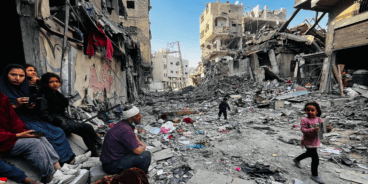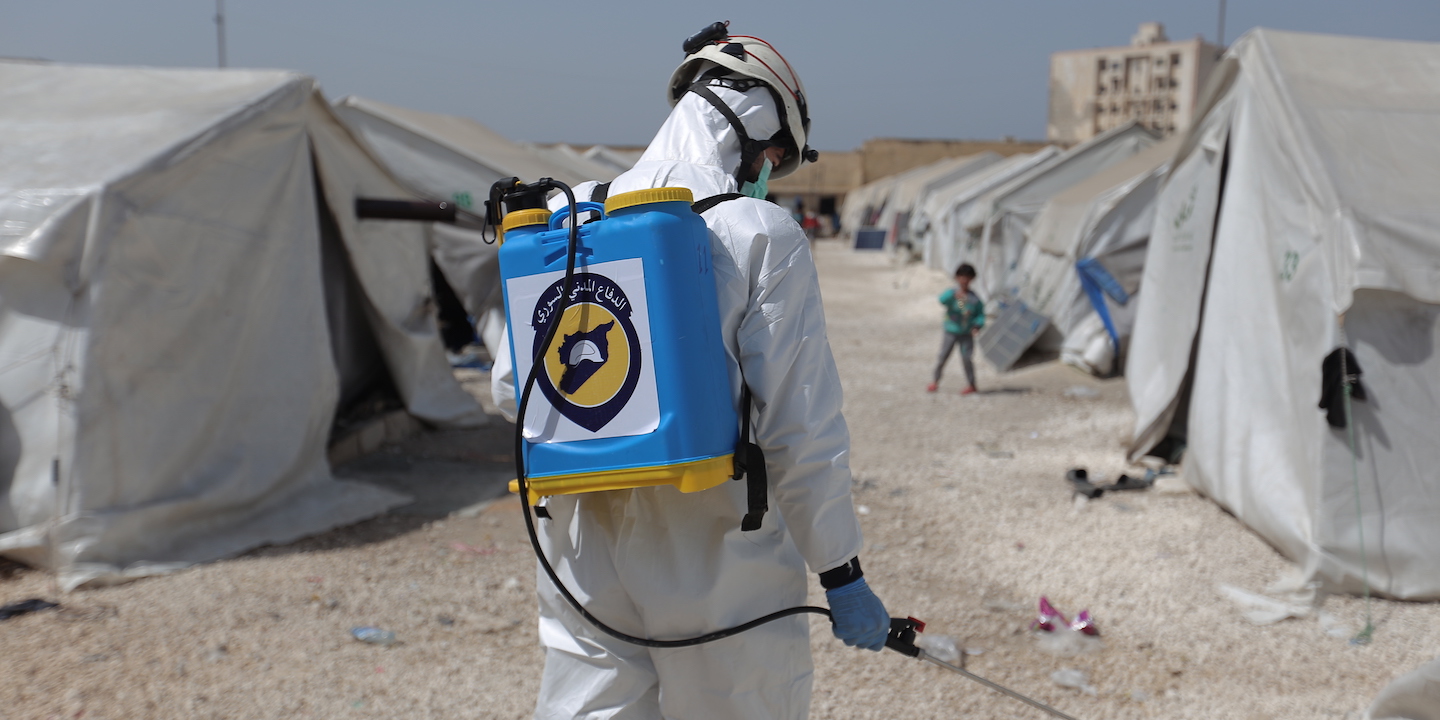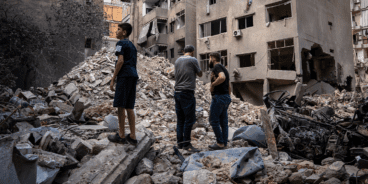

Atrocity Alert Special Issue: COVID-19, conflict and the threat of atrocities
The world is facing unprecedented challenges resulting from the pandemic caused by the novel coronavirus, COVID-19. Although it originated in China, as of 1 April the majority of the 910,000 confirmed cases and 45,000 reported deaths have been concentrated in wealthy developed countries, especially in Western Europe and the United States. But as COVID-19 continues to spread, the threat presented by the pandemic will also continue to evolve.
Around the world there are currently more than 70 million people forcibly displaced by conflict, persecution and atrocities, many of whom live in social conditions that leave them dangerously exposed to COVID-19. Severe shortages in medical equipment, protective clothing and health personnel will be especially dire in underdeveloped countries whose medical infrastructure has already been devastated by poverty and conflict. And the economies of developing countries that are already hosting the majority of the world’s 25 million refugees – such as Bangladesh, Jordan, Pakistan, or Turkey – simply do not have the capacity to sustain further economic strain. As a result, COVID-19 could potentially reshape and adversely affect the way the international community thinks and acts in relation to universal rights and global responsibilities.
Vulnerable Populations
Overcrowded refugee and IDP camps are conducive to the rapid spread of infectious diseases, with limited access to clean water or sanitation and almost no capacity to self-quarantine or practice social distancing. In Cox’s Bazar, Bangladesh, which hosts more than 900,000 Rohingya refugees who fled genocide in Myanmar, there are no intensive care facilities in the camps and the rapid spread of COVID-19 would be catastrophic. Restrictions on mobile and internet communications have prevented Rohingya refugees from accessing up-to-date information on how to slow the number of infections.
In Syria and Yemen, years of war and the sustained bombing of hospitals and other medical facilities has thoroughly destroyed both countries’ health infrastructure. These war crimes will now have a severe impact on the capacity to confront COVID-19. In Idlib, in northwest Syria, a military offensive by government forces has displaced more than 1 million people since December. According to Save the Children, there are only 153 ventilators and 148 ICU beds in the entire northwest region and fighting continues despite the arrival of the deadly virus in Syria. In Yemen, which is already confronting a cholera outbreak, flight bans and closed crossings – imposed due to COVID-19 – have disrupted life-saving humanitarian operations, exacerbating what is already the world’s largest humanitarian crisis.
Elsewhere in the world, ongoing attacks by armed groups not only place civilians at risk of atrocities, but also cause population flows that accelerate the spread of the virus. In Burkina Faso, which already has the highest number of confirmed COVID-19 cases in West Africa, violence by armed groups has forced more than 700,000 people to flee their homes over the past year and forced the closure of more than 135 health centers. The result is that as Burkina Faso faces a wave of COVID-19 infections, more than 1.6 million people living in conflict-affected areas of the country have little to no access to medical care.
Divided and Fragile Societies
In divided and fragile societies already suffering from identity-based conflict, the COVID-19 pandemic has also increased various risk factors that could lead to mass atrocity crimes – crimes against humanity, war crimes and genocide. COVID-19 cannot cause atrocities. But it could trigger social and economic crises that can be exploited by malignant political forces.
Fears regarding the rapid spread of the pandemic have already resulted in increased xenophobia and hate speech. On 30 March the UN Special Rapporteur on minority issues, Dr. Fernand de Varennes, said that, “reports of Chinese and other Asians being physically attacked, of hate speech blaming minorities including Roma, Hispanics and others for the spread of the virus, and of politicians calling for migrants to be denied access to medical services, all show that states need to urgently emphasize that the human rights of everyone, in particular the most vulnerable and marginalized, must be protected.”
The UN Special Adviser on the Prevention of Genocide, Adama Dieng, and the High Representative for the UN Alliance of Civilizations, Miguel Moratinos, similarly warned that, “allowing [the virus] to tear apart the fabric of our societies is perhaps one of the most serious upheavals that the COVID-19 pandemic is inflicting upon our world.”
Border restrictions to contain the spread of COVID-19 can also enable human rights abuses. In Greece, authorities were already using water cannon, tear gas and stun grenades to repel thousands of asylum seekers, mainly Syrians, who were trying to enter the European Union through Greece. The government has now closed the border and effectively shut down the asylum registration system. It has also instituted curfews that reduce essential services to temporary camps where earlier migrants already live in precarious conditions.
Some governments and politicians are already taking advantage of the pandemic to bolster their personal power or weaken human rights protections. On Monday, 30 March, the parliament in Hungary passed an emergency law to allow Prime Minister Victor Orbán to rule by decree, indefinitely. Orbán has a history of making antisemitic and xenophobic statements and has been accused by local civil society activists of having authoritarian ambitions. He will now be able to rule with almost no parliamentary constraint.
In the Democratic Peoples’ Republic of Korea (DPRK) the government has been accused by a UN Commission of Inquiry of committing crimes against humanity. Despite sharing a border with two countries that have been severely affected by the pandemic, China and South Korea, the government of DPRK claims that it has no COVID-19 cases. Pervasive censorship means that millions of North Koreans could face the threat of widespread community infection without access to even basic information about the nature of the crisis the country is facing.
Meanwhile in Sri Lanka, President Gotabaya Rajapaksa pardoned former Sgt. Sunil Ratnayake, one of the few soldiers convicted of perpetrating atrocities during the 1983-2009 civil war against the Liberation Tigers of Tamil Eelam. The Office of the UN High Commissioner for Human Rights criticized the decision stating that, the pardon was “yet another example of the failure of Sri Lanka to fulfill its international human rights obligations to provide meaningful accountability for war crimes, crimes against humanity and other gross violations of human rights.”
Global Ceasefire and Defending Rights
In response to the current COVID-19 pandemic, on 25 March UN Secretary-General António Guterres called for an immediate global ceasefire, appealing for all parties to armed conflicts to focus on confronting the health emergency rather than fighting one another. Asserting that “the virus does not care about nationality or ethnicity, faction or faith,” the Secretary-General urged all warring parties to “silence the guns; stop the artillery; end the airstrikes.” The ceasefire would allow humanitarian actors to reach the most vulnerable populations and help protect health workers, who remain frequent targets in many conflict situations. Fifty-three UN member states announced their support for the global ceasefire in a letter on 30 March. The Global Centre for the Responsibility to Protect, and many other human rights and humanitarian organizations, have also supported the Secretary-General’s call.
As the world continues to confront the COVID-19 pandemic, it is essential that governments respond in ways that defend universal human rights, emphasize the inter-connectedness of humanity, and protect the vulnerable. Governments must ensure that all populations – regardless of ethnicity, religion, gender or identity – have equal access to essential medical services to treat COVID-19. The virus does not discriminate and does not respect national borders. We must actively prevent it from being used to stigmatize, marginalize and persecute others. Now, more than ever, the international community must emphasize that we have a collective responsibility to protect.
Related Content


Atrocity Alert No. 414: Lebanon, Ethiopia and the UN Human Rights Council
